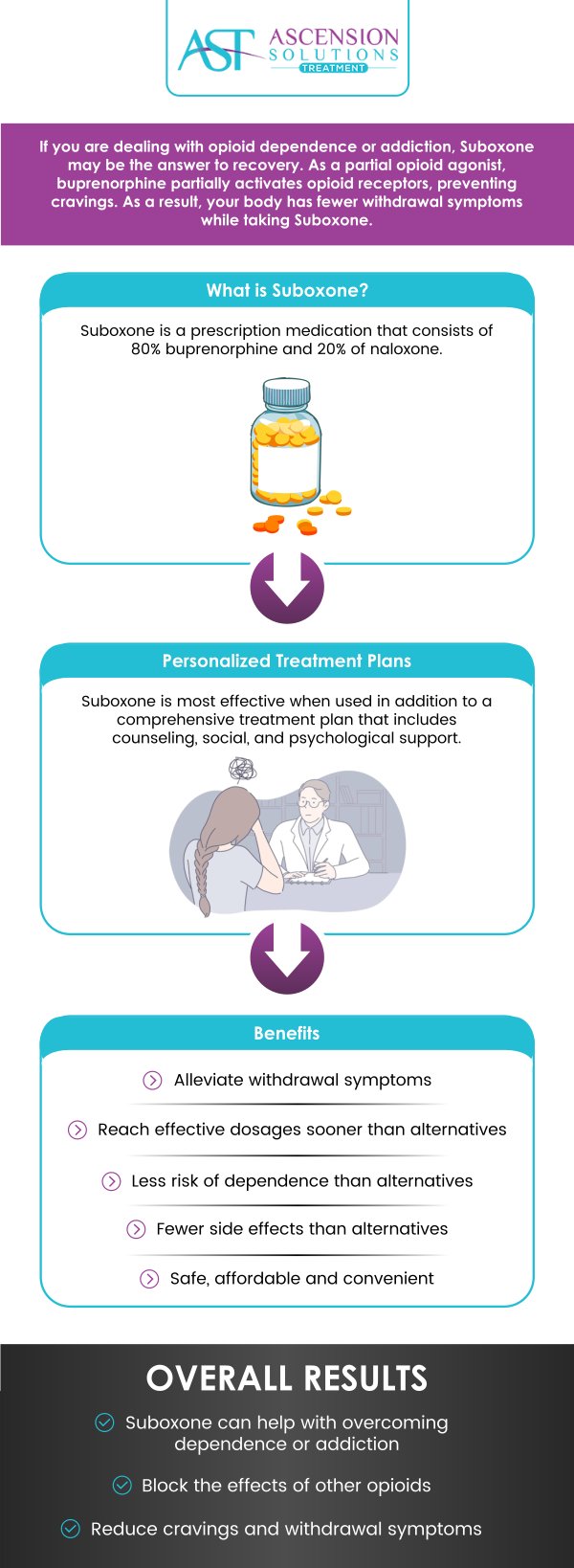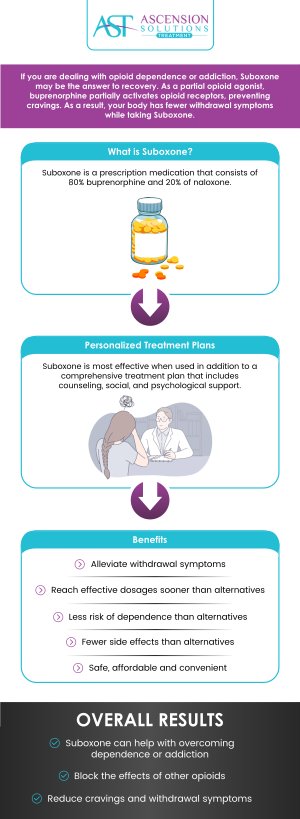Suboxone Treatment Doctors Q&A
Addiction and opioid dependency are increasingly recognized as medical conditions that benefit from treatment plans combining therapies and medications. Suboxone treatment ensures patients receive the most effective care tailored to their needs, supporting their journey toward recovery and a return to a healthier life. At Ascension Solutions Treatment Clinic, Board-certified Dr. Jonathan Hall, MD, provides comprehensive and specialized care to help individuals overcome opioid dependence and achieve lasting wellness. Contact us for more information or schedule an appointment online. We have convenient locations to serve you in Asheville NC and Peachtree Corners GA.




Table of Contents:
What is suboxone?
What can suboxone treat?
What are the benefits of suboxone?
How can suboxone help me?
How should I take Suboxone?
What should I avoid while taking Suboxone?
How long does Suboxone withdrawal last?
How long does it take for Suboxone to start working?
Why Should You Choose Dr. Jonathan Hall, MD, at Ascension Solution Treatment for Suboxone Treatment?
Opioid addiction or dependence can hurt an individual’s life, relationships, career, and overall health. At the same time, it can be challenging to find the right treatment or recovery program. Our staff understands this and is devoted to providing medication-assisted treatment with compassion and expertise.
Suboxone is a prescription medication that consists of 80% buprenorphine and 20% naloxone. Buprenorphine is a partial opioid agonist-antagonist, which means that it functions similarly to other opioids but does not produce a euphoric effect and blocks the effects of other opioids. As such, it is significantly less addictive than other opioids. Naloxone is an opioid antagonist, which means that it blocks the effects of other opioids. However, since Suboxone is taken either sublingually (under the tongue) or buccally (between the gums and cheek), the naloxone portion of Suboxone is inactive and only becomes active if the patient injects the medication. The addition of naloxone to Suboxone is to prevent the potential misuse of Suboxone.
Suboxone is approved by the Food and Drug Administration (FDA) to treat opioid dependence and addiction. With that in mind, Suboxone can help any individual who has become addicted to or is dependent on opioids such as fentanyl, heroin, hydrocodone, morphine, oxycodone, and others.
Suboxone treatment has the highest success rate for treating opioid dependency and addiction. It is most effective when used in conjunction with a comprehensive treatment plan that involves counseling, social, and psychological support.
Suboxone treatment can provide numerous benefits to individuals dealing with opioid dependence or addiction, including the following:
• Alleviating withdrawal symptoms
• Blocking the effects of other opioids
• Decreasing cravings
• Helping patients remain in treatment programs
• Fewer side effects and longer therapeutic effect than alternative treatments
• Less risk of dependence than alternatives
• Reaching effective dosages sooner than alternatives
• Reducing the unlawful use of opioids
• Safe, affordable, and convenient
If you are dealing with an opioid dependence or addiction and want to overcome your dependence or addiction, Suboxone can help you in the following ways:
• Blocking the effects of other opioids:
• As a partial opioid antagonist, buprenorphine displaces and prevents other opioids from activating the opioid receptors in your brain.
• Buprenorphine also has a ceiling effect, so that the effects of buprenorphine plateau after an individual takes a certain amount. The addition of naloxone further prevents misuse.
• Reducing cravings and withdrawal symptoms:
• As a partial opioid agonist, buprenorphine partially activates opioid receptors, preventing cravings.
• As a result, your body has fewer withdrawal symptoms when taking Suboxone.
Suboxone is an FDA-approved medication pivotal in the treatment of opioid addiction, often prescribed alongside counseling and behavioral therapy to form a holistic treatment plan.
Administering Suboxone properly hinges on closely following the instructions provided by healthcare specialists at Ascension Solutions Treatment.
The treatment regimen typically commences with an induction phase, where an initial assessment determines the suitable dosage. Following this, patients engage in counseling and support services aimed at addressing the underlying causes of their addiction. The subsequent maintenance phase allows patients to continue Suboxone use while gradually resuming their daily activities, eventually moving to a tapering phase.
Here, the dosage of Suboxone is methodically reduced under the guidance of a mental health provider until the patient can safely discontinue its use. Addiction and opioid dependency are increasingly viewed as medical conditions and as a result, treatment plans involving a combination of therapies and medications are considered more favorable than simply implementing an abstinence-based treatment plan.
This approach ensures that each patient’s treatment plan is accurately tailored to their specific needs, making adherence to these guidelines’ paramount.
While on Suboxone, patients must be careful and conscious about their health and lifestyle choices to avoid potential complications or adverse reactions.
Suboxone, being an opioid itself, necessitates strict adherence to the prescribed usage in order to prevent the risk of developing an addiction to the medication. Awareness and communication with healthcare providers at Ascension Solutions Treatment about one’s medical history and any medication use are critical to identify any possible interactions.
Patients are advised to abstain from alcohol and avoid certain medications that could infringe upon the medication’s effectiveness or even lead to severe drug interactions. The use of stimulant drugs, including methamphetamine and cocaine, which can negate Suboxone’s efficacy, is strongly discouraged.
Adhering to the guidance provided by healthcare professionals and promptly addressing any concerns or side effects that arise are crucial steps in safely navigating Suboxone treatment.
The duration and intensity of Suboxone withdrawal symptoms vary significantly among individuals, influenced by factors such as the duration of Suboxone use, the dosage level, and personal health conditions, including underlying mental health issues or alcohol use.
Suboxone, being an opioid itself, can lead to a range of dangerous withdrawal symptoms, particularly among individuals who cease use of the medication without instruction.
Typically, withdrawal symptoms can persist for about a month, with patients experiencing a range of symptoms that might include headaches, nausea, vomiting, muscle aches, mood swings, insomnia, and possibly symptoms of depression or intense drug cravings.
The withdrawal experience tends to peak in severity during the first week, especially within the first three days. Properly tapering off Suboxone, as directed by healthcare professionals, can substantially alleviate these symptoms, offering a controlled, less distressing, and dangerous withdrawal process.
The onset of Suboxone’s therapeutic effects varies from person to person, influenced by several factors including the individual’s history of opioid misuse, the severity of addiction, metabolic rate, age, weight, and other concurrent medications.
Generally, Suboxone begins to produce noticeable effects within 20 to 60 minutes after administration, providing prompt relief from withdrawal symptoms associated with opioid dependence. This rapid action is particularly beneficial in the initial stages of treatment, helping to stabilize patients and significantly reduce the discomfort of withdrawal.
The duration of Suboxone’s effectiveness can last between 12 to 24 hours, depending on the specific dosage and administration schedule tailored to the patient’s unique situation.
This individualized approach to treatment ensures that patients receive the most effective care for their addiction, supporting their journey toward recovery and a return to normal life.
If you’re seeking a compassionate and effective approach to Suboxone treatment, Dr. Jonathan Hall, MD, at Ascension Solution Treatment is dedicated to helping individuals on their path to recovery. With his expertise in addiction medicine and a focus on personalized care, Dr. Hall provides a comprehensive treatment plan designed to support both the physical and emotional aspects of healing. Here are several reasons why choosing Dr. Hall for Suboxone treatment can make a significant difference in your recovery journey:
1. Expertise in Addiction Medicine
Dr. Jonathan Hall, MD, brings years of experience in both family medicine and addiction treatment. His in-depth knowledge and board certification make him a trusted leader in providing effective Suboxone therapy.
2. Personalized Care
Dr. Hall takes a holistic approach to recovery, understanding that addiction affects both the mind and body. His treatment plans are tailored to meet the unique needs of each patient, supporting long-term healing and stability.
3. Comprehensive Treatment Options
Ascension Solution Treatment offers a full spectrum of services, including Suboxone treatment, Medication-Assisted Treatment (MAT), behavioral counseling, and other support tools. Dr. Hall ensures patients have access to a comprehensive plan that addresses all aspects of their recovery.
4. Compassionate and Supportive Environment
Dr. Hall emphasizes the importance of creating a compassionate and safe space for individuals battling addiction. His empathetic approach fosters trust and helps patients feel empowered throughout their recovery journey.
Do not hesitate to contact us today or request an appointment online. We are conveniently located in Peachtree Corners GA and Asheville NC. We serve patients from Peachtree Corners GA, Asheville NC, Swannanoa NC, Johns Creek GA, Woodfin NC, Biltmore Forest NC, Fairview NC, Roswell GA, Dunwoody GA, Pittsburg GA, Western North Carolina, and the surrounding areas.

Check Out Our 5 Star Reviews



Additional Services You May Need
▸ Addiction
▸ Medication Assisted Treatment
▸ Suboxone Treatment
▸ Behavioural Therapy
▸ Detox
▸ Vivitrol
▸ Sublocade
▸ Buprenorphine
▸ Depression
▸ Anxiety Disorder
▸ Subutex
▸ Alcohol Detox
▸ Brixadi
▸ Regenerative Medicine
▸ Ozone Therapy
▸ Spravato Treatment
▸ Hormone Replacement Therapy






